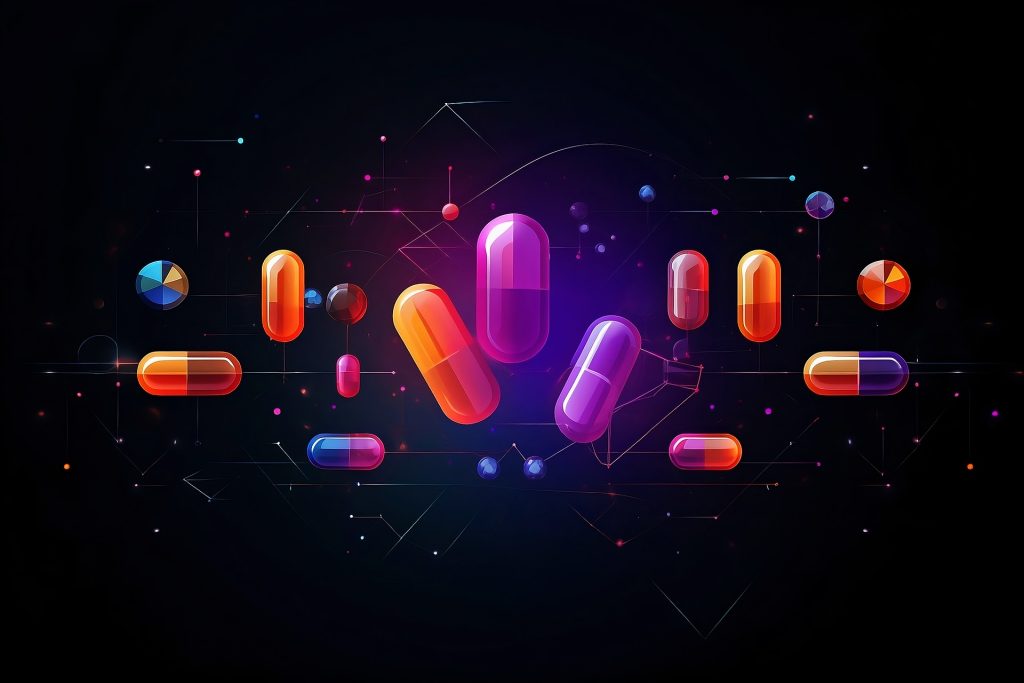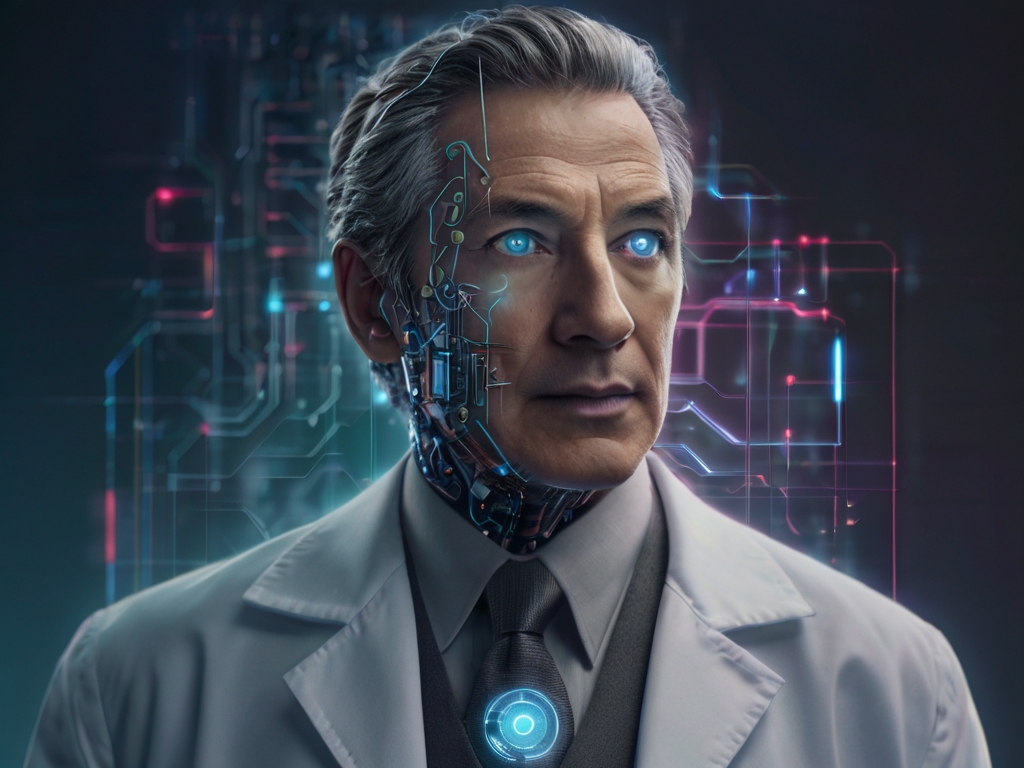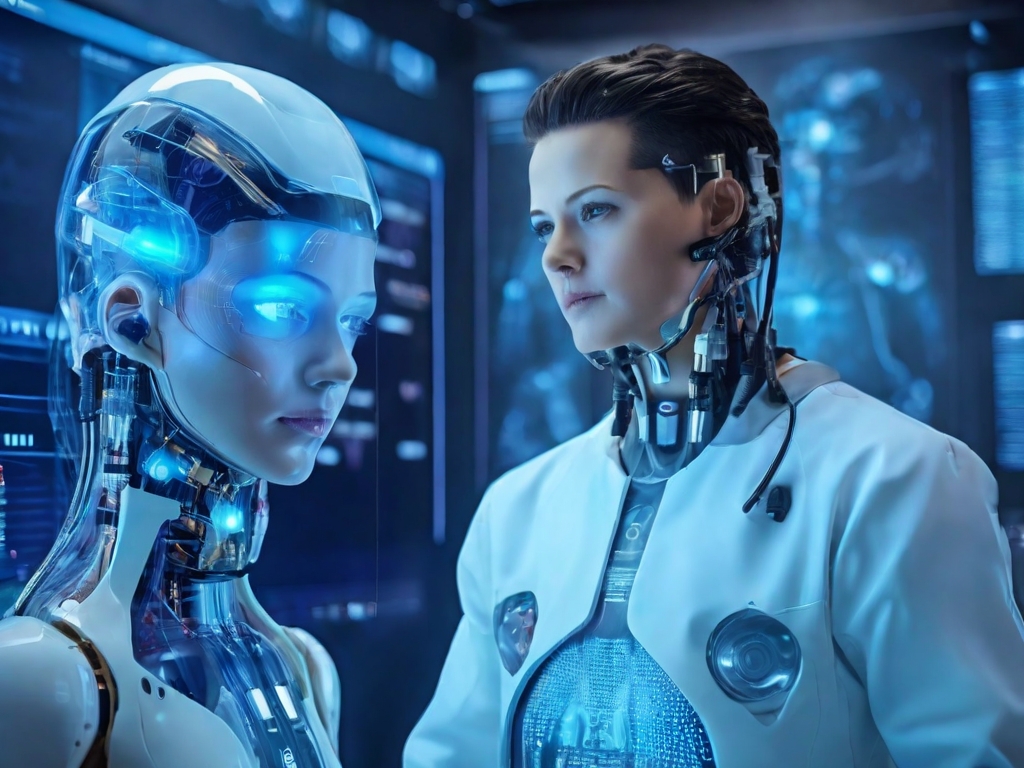The convergence of artificial intelligence (AI) and healthcare is nothing short of a revolution, one that promises to reshape the way we approach medical diagnosis, treatment, and overall patient care. As we stand at the precipice of this transformative era, the potential of AI to revolutionize the healthcare industry is both awe-inspiring and humbling.
Here we’ll embark on a journey through the vast landscape of AI applications in healthcare, exploring the cutting-edge technologies that are driving this transformation. From intelligent diagnostic tools to personalized medicine and drug discovery, we’ll unravel the intricacies of how AI is empowering healthcare professionals and improving patient outcomes.
But before we delve into the specifics, let’s first demystify the concept of AI and its underlying principles.
Demystifying AI: The Brains Behind the Revolution
At its core, AI is the simulation of human intelligence in machines, enabling them to learn, reason, problem-solve, and perceive the world around them. This broad field encompasses various technologies, including machine learning, deep learning, natural language processing (NLP), and computer vision, among others.
Machine learning, in particular, has been a game-changer in the healthcare domain. It involves training algorithms on vast amounts of data, enabling them to identify patterns, make predictions, and provide insights that augment human decision-making. Deep learning, a subset of machine learning, employs artificial neural networks to process and interpret complex data, such as medical images and genomic data.

NLP, on the other hand, allows AI systems to understand and interpret human language, enabling seamless communication between patients, healthcare providers, and intelligent virtual assistants.
With this foundational understanding of AI, let’s dive into the realm of its transformative applications in healthcare.
AI-Powered Diagnostic Tools: Enhancing Accuracy and Early Detection
One of the most profound impacts of AI in healthcare is its ability to improve diagnostic accuracy and enable early disease detection. Traditional diagnostic methods, while effective, can sometimes overlook subtle signs or patterns, leading to delayed diagnoses or misdiagnoses. AI, however, excels at analyzing vast amounts of data, including medical images, patient records, and laboratory results, with unparalleled precision.
1. Medical Imaging Analysis
AI algorithms, particularly those based on deep learning, have demonstrated remarkable proficiency in analyzing medical images, such as X-rays, CT scans, and MRI scans. These algorithms can detect minute abnormalities, patterns, and subtle changes that may be overlooked by the human eye, aiding in the early detection of diseases like cancer, heart conditions, and neurological disorders.
In 2019, researchers at Google developed an AI system that could identify breast cancer from mammograms with greater accuracy than human radiologists. The system achieved a staggering 89% accuracy rate in predicting which women would develop breast cancer, compared to 77% for radiologists.
2. Predictive Diagnostics
AI’s ability to analyze vast amounts of patient data, including medical histories, genetic information, and lifestyle factors, enables predictive diagnostics. By identifying patterns and correlations, AI algorithms can predict the likelihood of developing certain diseases or conditions, even before clinical symptoms manifest.
Researchers at the University of California, San Francisco (UCSF) developed an AI system that can predict a patient’s risk of developing Alzheimer’s disease up to six years before the onset of symptoms, with an accuracy rate of over 90%.
3. Natural Language Processing (NLP) in Diagnostics
NLP plays a crucial role in enhancing diagnostic accuracy by enabling AI systems to understand and interpret medical documentation, patient narratives, and clinician notes. By extracting relevant information from these unstructured data sources, NLP algorithms can provide valuable insights and support for diagnostic decision-making.
In 2021, researchers at the Massachusetts Institute of Technology (MIT) developed an AI system that could accurately diagnose COVID-19 from lung X-rays and patient症状describing, outperforming human radiologists in many cases.
Personalized Medicine: Tailoring Treatments to Individual Needs
The concept of personalized medicine, where treatments are tailored to an individual’s unique genetic makeup, medical history, and lifestyle factors, has long been a goal in healthcare. AI is making this vision a reality by enabling the analysis of vast amounts of patient data and identifying the most effective treatment strategies.

1. Genomic Analysis and Precision Oncology
In the field of oncology, AI is revolutionizing cancer treatment by analyzing genomic data from tumor biopsies. By identifying specific genetic mutations and molecular characteristics, AI algorithms can recommend targeted therapies and personalized treatment plans, increasing the likelihood of successful outcomes.
In 2020, researchers at the Memorial Sloan Kettering Cancer Center developed an AI system that could accurately predict the most effective cancer treatment for individual patients based on their genetic makeup and the molecular characteristics of their tumors.
2. Pharmacogenomics and Drug Response Prediction
AI is also playing a pivotal role in the field of pharmacogenomics, which studies how an individual’s genetic makeup influences their response to specific drugs. By analyzing a patient’s genetic data, AI algorithms can predict the efficacy and potential adverse effects of various medications, enabling healthcare providers to prescribe the most suitable treatment and optimize dosages.
In 2019, researchers at the University of Cambridge developed an AI system that could predict a patient’s response to a commonly prescribed antidepressant medication, with an accuracy rate of over 80%.
3. Digital Twins and Personalized Simulations
The concept of digital twins, virtual representations of individual patients, is gaining traction in personalized medicine. By combining AI with patient-specific data, including genomics, imaging, and medical records, healthcare providers can create personalized simulations to test and optimize treatment strategies before implementation.
Researchers at the Wake Forest Institute for Regenerative Medicine are developing digital twins of patients to simulate the effects of various treatments and interventions, with the goal of improving outcomes and reducing adverse events.
Drug Discovery and Development: Accelerating Innovation
The process of drug discovery and development is notoriously time-consuming and expensive, with the average cost of bringing a new drug to market exceeding $2.6 billion. AI is revolutionizing this process by enabling the rapid analysis of vast chemical and biological data, identifying potential new drug candidates, and predicting their interactions with different diseases.

1. Virtual Screening and Lead Optimization
AI algorithms can rapidly screen millions of chemical compounds, identify those with potential therapeutic properties, and optimize their structures for improved efficacy and reduced side effects. This virtual screening process significantly accelerates the early stages of drug discovery, reducing the time and resources required.
In 2020, researchers at the University of Cambridge used AI to identify a potential new antibiotic compound that could be effective against drug-resistant bacteria. The AI system analyzed over 107 million chemical compounds, narrowing it down to a promising candidate in just a few days – a process that would typically take years using traditional methods.
2. Molecular Modeling and Protein Structure Prediction
AI is also proving invaluable in molecular modeling and protein structure prediction, enabling researchers to gain insights into the intricate interactions between drugs and their target molecules. By accurately predicting protein structures, AI can guide the design of more effective and selective drugs, reducing the likelihood of off-target effects and adverse reactions.
In 2020, researchers at DeepMind, a subsidiary of Alphabet Inc. (Google’s parent company), developed an AI system called AlphaFold that could accurately predict the 3D structures of proteins based solely on their genetic sequences, a long-standing challenge in structural biology.
3. Clinical Trial Optimization
AI is also being leveraged to optimize clinical trials, the final and most costly stage of drug development. By analyzing data from previous trials and patient populations, AI algorithms can identify potential recruitment challenges, predict patient dropout rates, and suggest strategies to improve trial design and execution, ultimately reducing costs and accelerating the approval process for new drugs.
In 2021, pharmaceutical company Pfizer partnered with AI company Insilico Medicine to leverage AI for optimizing clinical trial design and patient recruitment for various therapeutic areas, including oncology, immunology, and rare diseases.
AI-Powered Patient Care Management: Enhancing Engagement and Adherence
Beyond diagnostics and treatment, AI is also transforming the way patient care is managed, enabling more personalized and engaging experiences while improving adherence to treatment plans.
1. Intelligent Virtual Assistants and Chatbots
AI-powered virtual assistants and chatbots are becoming increasingly prevalent in healthcare, providing patients with 24/7 access to medical information, advice, and support. These intelligent systems can answer questions, monitor symptoms, provide medication reminders, and even triage patients based on their reported symptoms, reducing the burden on healthcare providers and improving overall patient engagement.
In 2019, the UK’s National Health Service (NHS) launched an AI-powered virtual assistant called “Babylon Health” to triage patients and provide medical advice. The system can analyze a patient’s symptoms and medical history, recommend appropriate care, and even schedule appointments.

2. Remote Patient Monitoring and Wearable Technology
AI is enabling more effective remote patient monitoring through the integration of wearable devices and smart home technologies. By continuously collecting and analyzing data on vital signs, activity levels, and other biometric indicators, AI algorithms can detect potential health issues early, provide personalized health recommendations, and alert healthcare providers when intervention is necessary.
In 2021, the University of California, San Francisco (UCSF) partnered with Apple to develop an AI-powered health monitoring platform that leverages data from the Apple Watch and other wearable devices to monitor patients with chronic conditions, such as heart disease and diabetes.
3. Medication Adherence and Personalized Care Plans
AI can play a crucial role in improving medication adherence by providing personalized reminders, tracking adherence patterns, and identifying potential barriers to adherence. Furthermore, AI algorithms can analyze a patient’s medical history, lifestyle factors, and preferences to develop personalized care plans that are tailored to their unique needs and circumstances.
In 2020, researchers at the University of Pennsylvania developed an AI-powered mobile app called “LifeLoop” that helps patients with chronic conditions manage their medication regimens and adhere to personalized care plans. The app uses AI to provide customized reminders, track adherence, and offer educational resources tailored to each individual’s needs.
Administrative Efficiency and Healthcare Operations
Beyond clinical applications, AI is also transforming the administrative and operational aspects of healthcare, streamlining processes, reducing costs, and improving overall efficiency.
1. Medical Coding and Billing Automation
AI algorithms are being employed to automate the complex and time-consuming processes of medical coding and billing. By analyzing medical records, diagnoses, and procedures, AI systems can accurately assign the appropriate codes, reducing errors and improving reimbursement rates for healthcare providers.
In 2021, the University of Michigan Health System implemented an AI-powered medical coding system developed by Nuance Communications, resulting in a 30% increase in coding accuracy and a significant reduction in coding time.
2. Resource Allocation and Scheduling Optimization
AI is also being leveraged to optimize resource allocation and scheduling within healthcare facilities. By analyzing patient flow, staffing levels, and resource availability, AI algorithms can identify potential bottlenecks, streamline appointment scheduling, and ensure efficient utilization of resources, resulting in improved patient experiences and reduced wait times.
In 2019, the University of Pittsburgh Medical Center (UPMC) implemented an AI-powered scheduling system developed by Epic Systems, which optimized appointment scheduling and reduced patient wait times by up to 50%.
3. Supply Chain Management and Inventory Optimization
AI can also play a crucial role in supply chain management and inventory optimization within healthcare organizations. By analyzing historical data, forecasting demand, and monitoring real-time supply levels, AI algorithms can help ensure the efficient allocation and distribution of medical supplies, reduce waste, and prevent shortages.
In 2021, the Cleveland Clinic partnered with AI company Vizient to develop an AI-powered supply chain management system that optimizes inventory levels and reduces waste, saving the healthcare system millions of dollars annually.
Challenges and Ethical Considerations
While the potential benefits of AI in healthcare are vast, several challenges and ethical considerations must be addressed to ensure its safe, responsible, and equitable implementation.

1. Data Privacy and Security
AI systems in healthcare rely on vast amounts of sensitive patient data, raising concerns about data privacy and security. Strict measures must be in place to protect this information from unauthorized access, breaches, and misuse, while ensuring compliance with regulations such as HIPAA and GDPR.
2. Algorithmic Bias and Fairness
AI algorithms can perpetuate biases present in their training data, leading to potential discrimination and unfair treatment of certain patient populations. Rigorous testing, auditing, and debiasing techniques are necessary to ensure that AI systems are fair and unbiased, providing equitable care for all.
3. Transparency and Interpretability
As AI systems become more complex, it can be challenging to understand how they arrive at their decisions, raising concerns about transparency and interpretability. Healthcare professionals and patients alike need to understand the reasoning behind AI-driven recommendations to build trust and ensure accountability.
4. Human-AI Collaboration and Trust
For AI to be truly effective in healthcare, it must gain the trust and acceptance of healthcare professionals and patients. Effective human-AI collaboration requires clear communication, transparency, and a shared understanding of the respective roles and responsibilities of humans and AI systems.
5. Ethical Governance and Oversight
The integration of AI in healthcare raises ethical concerns regarding decision-making authority, accountability, and the potential impact on patient autonomy. Robust ethical governance frameworks and oversight mechanisms are necessary to ensure that AI is developed and deployed in a responsible and ethical manner, with patient well-being as the primary consideration.
6. Equitable Access and Affordability
As AI technologies become more prevalent in healthcare, there is a risk of exacerbating existing disparities and inequalities in access to quality care. Efforts must be made to ensure that AI-driven solutions are accessible and affordable for all, regardless of socioeconomic status or geographic location.
Addressing these challenges and ethical considerations will require collaborative efforts from healthcare providers, technology companies, policymakers, ethicists, and patient advocates, fostering an environment of trust, transparency, and shared responsibility.
The Future of AI in Healthcare: Boundless Possibilities
As we look towards the future, the possibilities for AI in healthcare are boundless, with the potential to revolutionize the way we approach medical care and improve the overall well-being of individuals and communities.

1. AI-Augmented Clinical Decision Support
The future envisions AI systems seamlessly integrated into clinical workflows, providing real-time decision support to healthcare professionals. These AI-augmented systems will continuously learn and adapt, leveraging the latest medical research, patient data, and clinical best practices to offer personalized and evidence-based recommendations for diagnosis, treatment, and care management.
2. Precision Public Health and Population-Level AI
AI will play a vital role in precision public health, enabling the analysis of population-level data to identify health trends, monitor disease outbreaks, and develop targeted interventions. By integrating AI with epidemiological data, environmental factors, and socioeconomic indicators, public health officials can design more effective strategies for disease prevention and health promotion.
3. AI-Driven Regenerative Medicine and Tissue Engineering
The convergence of AI, regenerative medicine, and tissue engineering holds immense potential for personalized regenerative therapies. AI algorithms can analyze patient-specific data, including genetic and molecular profiles, to design and optimize biomaterials, scaffolds, and stem cell therapies tailored to individual needs, revolutionizing the treatment of injuries, degenerative diseases, and congenital conditions.
4. Intelligent Robotic Assistants and Smart Hospitals
The future of healthcare facilities envisions the integration of intelligent robotic assistants and smart technologies, creating seamless and efficient environments for patient care. AI-powered robots can assist with tasks such as patient monitoring, medication delivery, and even surgical procedures, while smart hospital systems optimize resource allocation, energy efficiency, and patient flow.
5. AI-Enabled Brain-Computer Interfaces and Neuromodulation
The intersection of AI and neuroscience opens up new frontiers in the treatment of neurological disorders and the enhancement of cognitive abilities. AI-enabled brain-computer interfaces and neuromodulation technologies can help restore lost functions, alleviate symptoms, and potentially augment cognitive capabilities, offering new hope for individuals with conditions like Alzheimer’s, Parkinson’s, and traumatic brain injuries.
While these future possibilities may seem like science fiction today, the rapid pace of AI development and the growing investment in healthcare innovation suggest that they may become a reality sooner than we think. However, as we venture into these uncharted territories, it is crucial to maintain a steadfast commitment to ethical principles, responsible innovation, and a patient-centric approach.

The AI healthcare revolution is well underway, and its impact is already being felt across various aspects of medical practice. From improving diagnostic accuracy and personalized treatment to streamlining administrative tasks and accelerating drug discovery, AI is proving to be a game-changer in the healthcare industry.
However, as with any transformative technology, the integration of AI in healthcare comes with its own set of challenges and concerns. Addressing issues such as data privacy, algorithmic bias, transparency, regulatory compliance, and physician trust will be crucial to ensuring the responsible and ethical implementation of AI in healthcare.
As we move forward, the future of AI in healthcare promises even more exciting developments, such as predictive and preventive care, precision medicine 2.0, AI-assisted robotic surgery, and intelligent prosthetics and implants. These futuristic applications have the potential to revolutionize healthcare and improve the quality of life for people around the globe.
Ultimately, the success of AI in healthcare will depend on the collective efforts of healthcare providers, technology companies, policymakers, and researchers working together to harness the power of AI while ensuring patient safety, privacy, and ethical considerations remain at the forefront.
The AI healthcare revolution is not just a technological advancement; it’s a paradigm shift that has the potential to transform the way we approach medical care, improve patient outcomes, and ultimately, save lives.
Copyright©dhaka.ai
tags: Artificial Intelligence, Ai, Dhaka Ai, Ai In Bangladesh, Ai In Dhaka, USA, Healthcare



